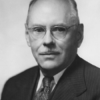Frank Knight

Frank Knight
Frank Hyneman Knightwas an American economist who spent most of his career at the University of Chicago, where he became one of the founders of the Chicago school. Nobel laureates Milton Friedman, George Stigler and James M. Buchanan were all students of Knight at Chicago. Ronald Coase said that Knight, without teaching him, was a major influence on his thinking...
NationalityAmerican
ProfessionEconomist
Date of Birth7 November 1885
CountryUnited States of America
mind economics professors
...even professors of economics, to say nothing of the public, do not generally have scientific minds.
attitude opinion evolution
Always history is being made; opinions attitudes and institutions change, and there is evolution in the nature of capitalism
moving differences movement
Goods move in response to price differences from points of low to points of higher price, the movement tending to obliterate the price difference and come to rest.
risk cost competing
Costs merely register competing attractions.
past swag identity
The possibility of saying anything about a thing rests on the assumption that it preserves its identity, or continues to be the same thing in the respect described, that it will behave in future situations as it has in past.
struggle mean revolution
If all properly economic problems were solved once for all . . . the social struggle and strife would . . . [not necessarily] be reduced in amount or intensity . . . in the absence of some moral revolution which could by no means be assumed to follow in consequence of this change itself.
war causes conflict
Conflicting economic interest is relatively unimportant as a cause of war.
team block play
One-third of your plays are special teams, so to block a punt and get good field position out of it and score was big.
jobs rome may
I have been....moved to wonder whether my job is a job or a racket, whether economists, and particularly economic theorists, may not be in the position that Cicero, citing Cato, ascribed to the augurs of Rome-that they should cover their faces or burst into laugher when they met on the street.
force exception ifs
It is true practically if not altogether without exception that the changes studied by any science tend to equilibrate or neutralize the forces which bring them about, and finally to come to rest.
jobs exercise people
The probability of the people in power being individuals who would dislike the possession and exercise of power is on a level with the probability that an extremely tender-hearted person would get the job of whipping-master in a slave plantation.
law sociology
Sociology isthescience of talk, and there is onlyone law in sociology. Bad talk drives out good.
education knowledge learning
Knowledge is more a matter of learning than of the exercise of absolute judgment. Learning requires time, and in time the situation dealt with, as well as the learner, undergoes change.
aspect unchanging static
All science is static in the sense that it describes the unchanging aspects of things.